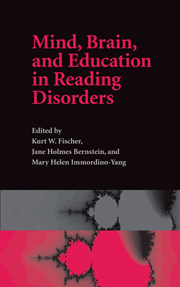Book contents
- Frontmatter
- Contents
- List of figures
- List of tables
- List of contributors
- Acknowledgements
- Part I What is Reading, and What are Reading Disorders? Looking to Neuroscience, Evolution, and Genetics
- Part II Reading and the Growing Brain: Methodology and History
- 4 A brief history of time, phonology, and other explanations of developmental dyslexia
- 5 Approaches to behavioral and neurological research on learning disabilities: in search of a deeper synthesis
- 6 Growth cycles of mind and brain: analyzing developmental pathways of learning disorders
- Essay: Cycles and gradients in development of the cortex
- 7 Brain bases of reading disabilities
- 8 The neural correlates of reading disorder: functional magnetic resonance imaging
- 9 Patterns of cortical connection in children with learning problems
- Essay: The role of experience in brain development: adverse effects of childhood maltreatment
- Part III Watching Children Read
- Part IV Reading Skills in the Long Term
- Appendix: Transcript and behavioral data from Profiles in Reading Skills (Four Boys)
- Index
- References
4 - A brief history of time, phonology, and other explanations of developmental dyslexia
Published online by Cambridge University Press: 22 September 2009
- Frontmatter
- Contents
- List of figures
- List of tables
- List of contributors
- Acknowledgements
- Part I What is Reading, and What are Reading Disorders? Looking to Neuroscience, Evolution, and Genetics
- Part II Reading and the Growing Brain: Methodology and History
- 4 A brief history of time, phonology, and other explanations of developmental dyslexia
- 5 Approaches to behavioral and neurological research on learning disabilities: in search of a deeper synthesis
- 6 Growth cycles of mind and brain: analyzing developmental pathways of learning disorders
- Essay: Cycles and gradients in development of the cortex
- 7 Brain bases of reading disabilities
- 8 The neural correlates of reading disorder: functional magnetic resonance imaging
- 9 Patterns of cortical connection in children with learning problems
- Essay: The role of experience in brain development: adverse effects of childhood maltreatment
- Part III Watching Children Read
- Part IV Reading Skills in the Long Term
- Appendix: Transcript and behavioral data from Profiles in Reading Skills (Four Boys)
- Index
- References
Summary
Overview: Throughout the history of the study of reading disabilities, research has been plagued by the heterogeneity inherent in individuals with dyslexia and the apparent contradictions in findings that this variability produces. In this thematic review of historical and current approaches, the authors transform this view of variability to show how it is a key source of information about development of the normal reading process and sources of reading problems. The new emphasis on connecting mind, brain, and education requires relating neurological and behavioral aspects of dyslexia in its varied forms. In their work the authors focus especially on understanding how reading disability relates both to processes underlying the slow retrieval of names for common visual stimuli, such as letters, numbers, and colors, and also to phonological processes. They discuss the educational implications of their findings for the historical conflict between “whole language” and “phonological” approaches to reading instruction. Looking to the future, they suggest that only through considering the complexity of the reading process and the variability present in reading disability profiles can progress be made in unlocking the true nature of this disorder.
The EditorsThe title of this paper, “A brief history of time, phonology, and other explanations of developmental dyslexia,” was meant not only to evoke the title of Stephen Hawking's book, A Brief History of Time (1988), but also to underscore the similarly Sisyphean nature of both endeavors.
- Type
- Chapter
- Information
- Mind, Brain, and Education in Reading Disorders , pp. 61 - 79Publisher: Cambridge University PressPrint publication year: 2007
References
- 1
- Cited by

